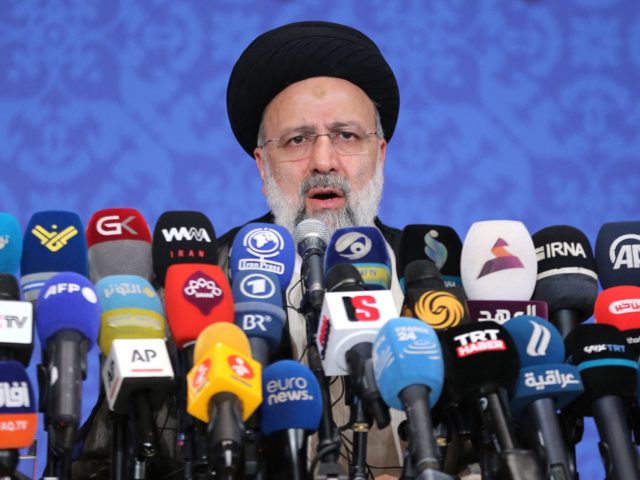Ebrahim Raisi, the head of Iran’s judiciary and the country’s incoming president, defended his role in mass executions in 1988 at a press conference Monday, telling journalists that he was a “defender of human rights.”
The Times of Israel reported:
Judiciary chief Ebrahim Raisi described himself as a “defender of human rights” when asked about his involvement in the 1988 mass execution of thousands of people.
“All that I have done through my years of service has always been towards defending human rights,” said the Iranian president-elect, accusing the West of violating human rights.
The Associated Press described Raisi’s role in the 1988 executions when he became judiciary chief in 2019:
After Iran’s then-Supreme Leader Ruhollah Khomeini accepted a U.N.-brokered cease-fire, members of the Iranian opposition group Mujahedeen-e-Khalq, heavily armed by Saddam Hussein, stormed across the Iranian border in a surprise attack.
Iran ultimately blunted their assault, but the attack set the stage for the sham retrials of political prisoners, militants and others that would become known as “death commissions.” Some who appeared were asked to identify themselves. Those who responded “mujahedeen” were sent to their deaths, while others were questioned about their willingness to “clear minefields for the army of the Islamic Republic,” according to a 1990 Amnesty International report.
International rights groups estimate that as many as 5,000 people were executed, while the MEK puts the number at 30,000. Iran has never fully acknowledged the executions, apparently carried out on Khomeini’s orders, though some argue that other top officials were effectively in charge in the months before his 1989 death. Raisi reportedly served on a panel involved in sentencing the prisoners to death.
Raisi also ruled out a meeting with U.S. President Joe Biden and demanded that the U.S. remove all sanctions on Iran. He said there would be no compromise on ballistic missile development or Iran’s support for regional terror groups as a condition of returning to the Iran deal.
Biden has been eager to restore the deal, and has turned away from traditional U.S. allies in the region since taking office in an apparent effort to show American willingness to accommodate Iran. Biden’s diplomatic envoy to Iran, Rob Malley, is in Vienna trying to continue talks toward returning to the deal negotiated by President Barack Obama, under which Iran only agreed to pause nuclear enrichment activity for about a decade.
Raisi was elected after the country’s religious leaders handpicked the candidates. A significant portion of the voting population boycotted the election or spoiled their ballots.
New Israeli Prime Minister Naftali Bennett said Raisi’s election ought to be a sign to world leaders to “wake up” about Iran and the danger of returning to the nuclear deal.
Raisi will officially take office in August. The Biden administration is said to be desperate to reach a nuclear deal before he does.
Joel B. Pollak is Senior Editor-at-Large at Breitbart News and the host of Breitbart News Sunday on Sirius XM Patriot on Sunday evenings from 7 p.m. to 10 p.m. ET (4 p.m. to 7 p.m. PT). He is the author of the new e-book, The Zionist Conspiracy (and how to join it). His recent book, RED NOVEMBER, tells the story of the 2020 Democratic presidential primary from a conservative perspective. He is a winner of the 2018 Robert Novak Journalism Alumni Fellowship. Follow him on Twitter at @joelpollak.

COMMENTS
Please let us know if you're having issues with commenting.